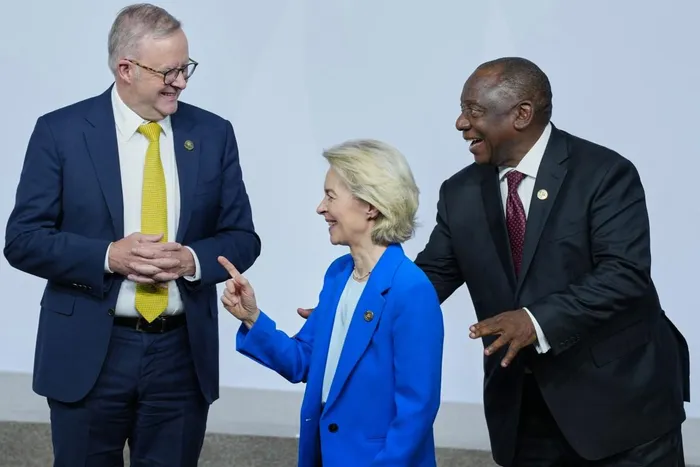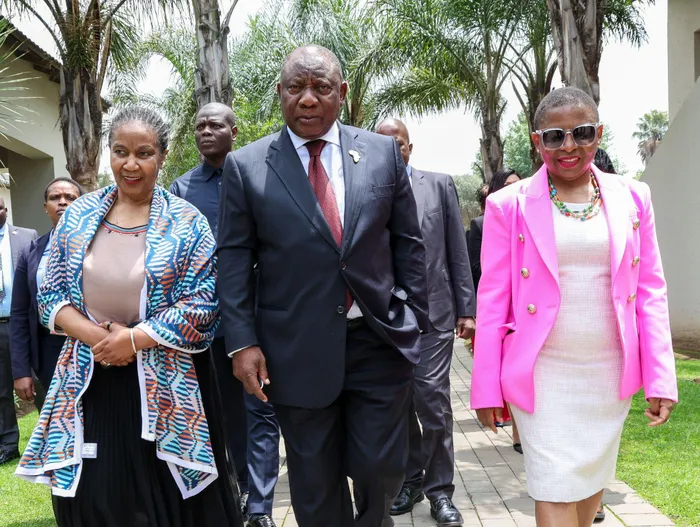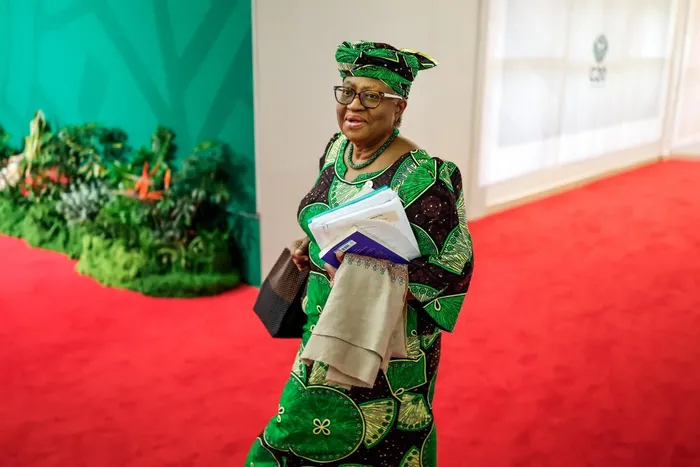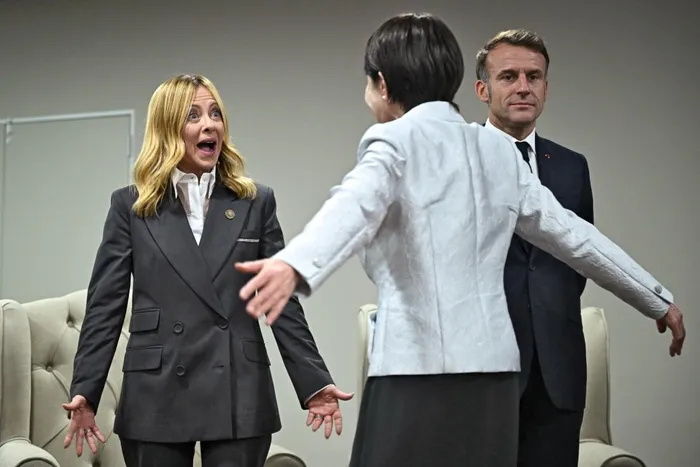Power moves: Women leaders shaping the G20 agenda at Johannesburg summit

European Commission President Ursula von der Leyen reacts with Australia's Prime Minister Anthony Albanese (L) and South Africa's President Cyril Ramaphosa during a family photo event during a G20 Leaders' Summit plenary session at the Nasrec Expo Centre in Johannesburg on November 22, 2025.
Image: Misper Apawu / POOL / AFP
As leaders from around the world gathered at the Nasrec Expo Centre for the G20 Summit, a cohort of powerful women heads of government and international institutions stepped into the spotlight, using their influence to shape the global agenda on economic justice, gender equality, and inclusive growth.
Among the most prominent figures are Italy’s Prime Minister Giorgia Meloni, the President of the European Commission Ursula von der Leyen, Japan’s Prime Minister Sanae Takaichi and World Trade Organization (WTO) Director-General Ngozi.
On local shores, South Africa’s influential women leaders, Khumbudzo Ntshavheni and Phumzile Mlambo-Ngcuka, were appointed as Co-Convenors of the G20 Social Summit, the social track of South Africa’s G20 presidency.

Phumzile Mlambo-Ngcuka and Khumbudzo Ntshavheni, two of South Africa’s most influential women leaders, were appointed as Co-Convenors of the G20 Social Summit.
Image: X
According to the Presidency, their mandate is to ensure that the voices often left out of global economic policymaking, including grassroots organisations, women’s rights groups, labour, youth, disability advocates, and broader civil society, are brought directly into the G20 process. Their appointment signals a deliberate shift toward a more people-centred G20, one that anchors its economic agenda in lived realities across Africa and the Global South.
Their presence underscores a significant shift: women are no longer just participants in global forums; they are architects of the conversation.

World Trade Organization (WTO) Director-General Ngozi.
Image: AFP
Long before the summit opened, the Women20 (W20) engagement group, an official G20 track, laid down a challenge. At their summit in Johannesburg earlier in October, W20 delegates called on world leaders to place women at the very heart of G20 policies.
Their demands were clear: more entrepreneurship support, better financial inclusion, a stronger care economy, equal access to education and STEM, and decisive action on violence against women. As South Africa chairs the G20 this year, the stakes for these issues are especially high. The W20 communiqué, officially handed over to government leaders, is not just symbolic; it’s a blueprint for structural change.
The women at the summit are pushing beyond gender issues; their influence extends into global economic governance, debt reform, and climate justice.

Italy's Prime Minister Giorgia Meloni greets Japan's Prime Minister Sanae Takaichi on the sidelines of a G20 Leaders' Summit plenary session at the Nasrec Expo Centre in Johannesburg on November 22, 2025.
Image: Leon Neal / POOL / AFP
Debt and development finance: Under South African leadership, the G20 is expected to make progress on reforming international finance structures. The “Cost of Capital Commission,” championed by the presidency, aims to make funding more accessible and fair for developing economies.
Energy transition: Critical for many Global South countries, a just energy transition is high on the agenda. Women leaders are calling for mechanisms to ensure that climate finance is not just generously pledged, but equitably distributed.
Inequality emergency: A report commissioned by South Africa and led by Nobel economist Joseph Stiglitz warned of a deepening “inequality emergency.” The findings that wealth was becoming massively concentrated were expected to fuel discussions on a new international panel to diagnose and address global inequality.

Japan's Prime Minister Sanae Takaichi attends a G20 Leaders' Summit plenary session at the Nasrec Expo Centre in Johannesburg on November 22, 2025.
Image: Thomas Mukoya / POOL / AFP
In her role as a powerful European leader, Ursula von der Leyen was uniquely positioned to broker cooperation between the EU and the Global South. She and other female leaders were likely to champion policies that align with the W20 recommendations, such as financial inclusion, better access to credit, digital banking, and capital for women entrepreneurs, particularly in marginalised communities.
Care economy investment: Recognising that unpaid care work, mostly done by women, is a foundation of economies, negotiators are pushing for infrastructure to support childcare, eldercare, and decent work for care workers. Leaders were under pressure to embed gender-based violence (GBV) prevention and response into national and international economic planning.
Women such as Meloni, von der Leyen, and Takaichi were central to the G20 negotiations, and this was more than symbolism. It signaled a realignment, one in which gender equality was not peripheral but central to global governance. For Italy’s Meloni, the summit was a chance not just to influence European-G20 ties, but also to push on development and migration issues. For von der Leyen, it’s a platform to unify EU backing behind social and green investments. For Takaichi, the moment reinforces Japan’s commitment to global financial stability and innovation, especially in an era defined by technological disruption.
And for civil society, the call is clear: they expect these leaders to deliver on the W20’s bold agenda, turning promises into policy. Beyond the bilateral talks and grand photo-ops, what’s happening in Johannesburg could ripple far beyond the two days of summitry. If women leaders succeed in embedding their priorities into the G20’s final declaration, it could set a precedent for future summits, one in which gender equity frameworks, care economies, and inclusive growth are not afterthoughts but foundational pillars.
Related Topics: